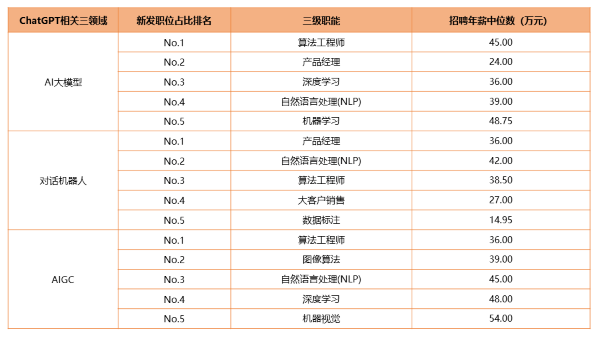Industry Observation: AI at the Forefront Opens New Opportunities for Tech Talent
-
New job postings for AI (Artificial Intelligence) large models increased by 10.16%, the median annual salary for machine learning positions reached 487,500 yuan, and AIGC (Generative AI) talent grew by 20.87%...
Since the beginning of this year, with ChatGPT taking the internet by storm, many domestic tech companies have entered the field of AI large models, making AI a new hotspot for attracting digital tech talent.
Data from Qichacha shows that since 2023, China has added 138,000 AI-related enterprises, with 114,000 newly registered in the first quarter alone, a 24.9% year-on-year increase (Note 1).
The booming AI industry is driving companies to compete for talent. Due to the popularity of technologies like image recognition, intelligent voice, generative AI, and large models, competition in these fields is fierce. To attract talent, companies are offering higher salaries. Reports indicate that not only are tech giants like Baidu, Tencent, Alibaba, and ByteDance offering high salaries to 'snatch' talent, but research institutions, startups, and smartphone manufacturers are also stepping up recruitment of digital tech professionals.
According to Liepin's '2023 Q1 Employment Trend Big Data Report,' the number of new job postings in the AI large model field grew by 10.16% year-on-year in Q1, while AIGC-related roles increased by 2.39%, and conversational AI roles declined by 38.06%. In terms of salaries, AIGC positions had the highest median annual salary at 337,500 yuan, followed by conversational AI and AI large model roles at 312,000 yuan and 270,000 yuan, respectively.

Data source: Liepin Big DataIn terms of job-seeking, the attractive salaries and career prospects in AI and other digital tech industries are drawing more applicants.
Data from Lagou Recruitment shows that smart manufacturing/smart hardware and AI are the top choices for digital tech talent, with 25% of respondents aiming to enter these fields.
Zhaopin data reveals that in Q1, job applications from 2023 graduates for digital economy-related industries surged by 155.3% year-on-year.
Liepin data indicates that AIGC talent grew by over 20% year-on-year in Q1, while conversational AI talent increased by 7.9%.
Meanwhile, companies still face a shortage of digital professionals. A report released on March 17 by Social Sciences Academic Press, titled 'Research and Development Report on Industrial Digital Talent (2023),' points out that China currently has a digital talent gap of 25 to 30 million. A joint survey by Zhaopin and Peking University's National School of Development found that over 80% of companies began digital transformation in 2022, with 41.2% lacking professionals with digital expertise.
Industry experts believe that as digital transformation and intelligent upgrades accelerate across sectors, demand for digital talent will continue to rise.
'Currently, companies in every industry are advancing in automation, digitization, and intelligence, creating an urgent need for technical talent. The same applies to AI talent—demand will keep growing rapidly, especially for high-level positions,' said Li Qiang, Executive Vice President of Zhaopin. He predicts more companies will offer high salaries to attract top-tier talent to gain a competitive edge, with future talent structures trending toward higher education, interdisciplinary skills, and younger demographics.
'The emergence of large language models has convinced tech professionals that AI's human-like reasoning capabilities are becoming practical,' said Zhang Xiaosong, Dean of the School of Cyberspace Security at the University of Electronic Science and Technology of China. 'While technological advancements may seem to compete with existing jobs in the short term, over time, they will drive societal progress and create more job opportunities—for example, the rise of Prompt Engineers as a new profession.'
Zhang Xiaosong also pointed out that human innovation capabilities cannot be fully simulated by AI. By harnessing AI for their own purposes, it will open up greater development space for technological talents.
Note 1: Only enterprises whose company names, business scopes, or product names contain the keywords "artificial intelligence" or "AI" were counted.
